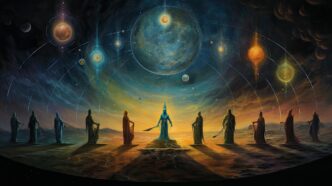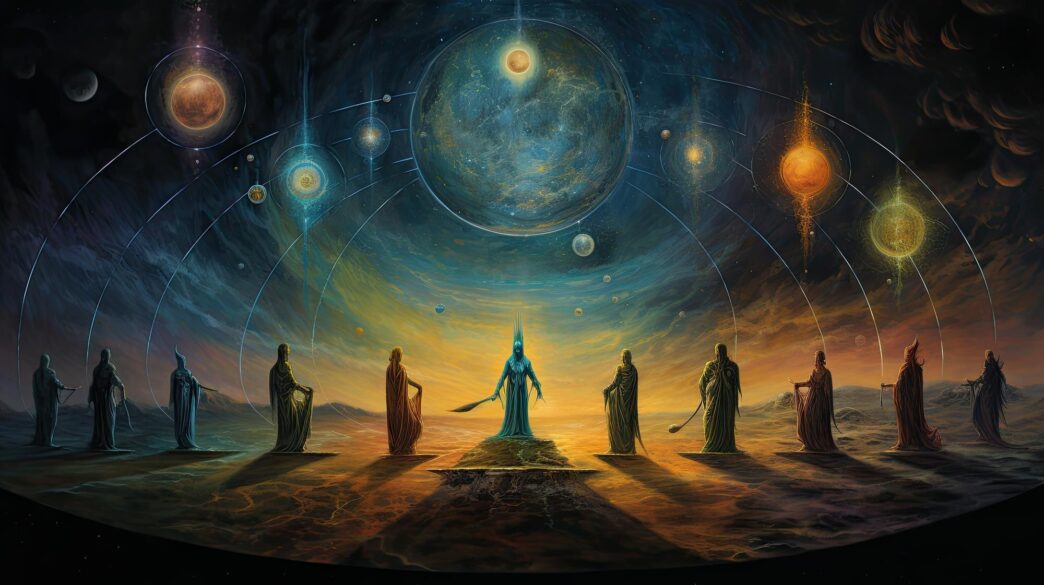A Glimpse of the Stars
Where the Planets Stand
Guiding Your Journey
Different Views of the Cosmos
The question of whether astrology and religion can coexist is a deeply personal and complex inquiry, often arising for individuals who seek meaning and guidance from both cosmic patterns and spiritual doctrines. For countless seekers across history and into the modern day, this exploration involves navigating the perceived tension between celestial influences and divine will, with the potential for harmony found in understanding each system’s unique offerings and limitations. This journey of reconciliation typically involves examining core tenets, historical perspectives, and individual interpretations of faith and the universe.
Understanding Astrology’s Appeal
Astrology, at its heart, is an ancient system that posits a meaningful relationship between celestial phenomena and events on Earth, particularly human affairs. It offers a framework for understanding personality, potential, and life cycles through the symbolic language of planets, zodiac signs, and houses.
A System of Self-Understanding
Many turn to astrology not as a predictive science, but as a profound tool for self-discovery and psychological insight. A natal chart, for instance, provides a symbolic map of the heavens at one’s birth, offering archetypal insights into strengths, challenges, and inner motivations. It helps individuals articulate their inherent nature and life path.
Beyond personal understanding, astrology also illuminates interpersonal dynamics and broader societal trends. By tracking planetary transits and progressions, individuals can gain perspective on opportune moments for action, periods of introspection, or times demanding resilience. This guidance is often seen as a way to work with, rather than against, cosmic currents.
Guidance, Not Determinism
A crucial distinction for many modern astrologers and practitioners is the emphasis on astrology as a tool for guidance, not rigid determinism. While planetary positions indicate energetic predispositions or themes, they do not dictate an unchangeable fate. Free will remains paramount, allowing individuals to consciously engage with and shape their experiences.
This perspective transforms astrology from a fatalistic prophecy into a dynamic system for conscious engagement with life’s unfolding. It empowers individuals to make informed choices, understand underlying patterns, and cultivate personal growth. The cosmos, in this view, mirrors our inner world and offers a rich symbolic vocabulary.
The Foundations of Religious Faith
Religion, conversely, typically provides a comprehensive worldview centered on the existence and worship of a divine entity or entities, a spiritual dimension, and often a moral code. It offers a framework for ultimate meaning, purpose, and salvation.
Divine Authority and Doctrine
Most religions are founded upon sacred texts, traditions, and doctrines believed to originate from divine revelation or enlightened prophets. These sources serve as the ultimate authority on truth, morality, and humanity’s relationship with the divine. Adherence to these doctrines is often central to religious practice and identity.
The divine is typically understood as the ultimate creator and sustainer of the universe, possessing omnipotence and omniscience. This belief system places ultimate control and knowledge in the hands of God or a higher power, shaping the understanding of fate, destiny, and human free will.
Community and Moral Frameworks
Religion also provides a strong sense of community, shared rituals, and a moral or ethical framework for living. It offers solace, belonging, and a path to spiritual fulfillment through prayer, meditation, and service. These aspects address fundamental human needs for connection and meaning.
The ethical guidelines derived from religious teachings often dictate right and wrong, guiding followers in their interactions with others and the world. This moral compass is seen as divinely inspired, offering clear directives for a righteous life. The focus is often on an afterlife or a spiritual transformation in this life.
Points of Conflict: Where Beliefs Diverge
Historically and doctrinally, several key areas often create tension between astrology and organized religion. These points of divergence are critical for understanding why some religious traditions explicitly forbid or discourage astrological practice.
The Question of Idolatry
Many monotheistic religions, such as Judaism, Christianity, and Islam, strictly prohibit idolatry—the worship of anything other than God. Astrological reverence for celestial bodies or the belief that they exert definitive control over human life can be perceived as elevating creation above the Creator. This is a primary theological objection.
From this perspective, seeking guidance or power from stars and planets could be seen as turning away from God, who is believed to be the sole source of all power and knowledge. It implies a reliance on forces other than the divine, which can be considered an affront to monotheistic principles.
Divine Providence vs. Cosmic Influence
A central tenet of many religions is divine providence—the belief that God actively governs and sustains the universe, orchestrating events according to a divine plan. This clashes with the astrological concept that planetary configurations influence human destiny, potentially diminishing God’s direct involvement.
If planetary movements are seen as deterministic, it can undermine the religious belief in God’s ongoing, personal interaction with humanity and His ultimate control over all outcomes. The question arises: Is it God’s will, or the stars’ influence, that truly shapes our lives?
Determinism and Free Will
While modern astrology emphasizes guidance over rigid fate, historical interpretations and common perceptions often lean towards determinism. This can directly conflict with religious doctrines that stress human free will, moral accountability, and the ability to choose between good and evil. If fate is predetermined by the stars, where does personal responsibility lie?
Religions often emphasize that individuals are responsible for their choices and actions, which determine their spiritual standing and ultimate destiny. A deterministic view of astrology can appear to absolve individuals of this responsibility, challenging the very foundation of religious ethics.
Scriptural Prohibitions
Many sacred texts contain explicit prohibitions against various forms of divination, sorcery, and practices associated with astrology. For example, the Bible, in both the Old and New Testaments, warns against consulting “star-gazers” or “soothsayers.” Islamic tradition also contains warnings against belief in astrology as a form of polytheism or associating partners with Allah.
These scriptural passages are often interpreted as direct commands from God to avoid practices that seek knowledge or power outside of divine revelation. They reinforce the idea that ultimate truth and guidance come solely from God, not from celestial omens.
Paths to Coexistence: Finding Harmony
Despite these significant points of divergence, many individuals and even some cultural traditions have found ways for astrology and religion to coexist, often through reinterpretation, symbolic understanding, or by viewing them as complementary rather than contradictory.
Astrology as a Psychological Tool
For some, astrology functions primarily as a psychological framework rather than a spiritual doctrine. They engage with their birth chart as a tool for self-reflection, understanding archetypal patterns, and exploring personal potential. In this view, astrology is a language for describing human experience, not a source of divine truth.
This approach allows individuals to benefit from astrology’s insights into personality and timing without seeing it as a challenge to their religious faith. It becomes a form of self-help or personal development, separate from theological concerns.
Astrology as a Spiritual Language
Others integrate astrology by viewing the cosmos as a magnificent manifestation of the divine Creator. They see planetary movements and configurations as part of God’s intricate design, a symbolic language through which the divine communicates or reflects universal principles. The stars are not worshipped, but rather seen as pointers to God’s majesty.
In this context, astrology can deepen one’s appreciation for the divine order and the interconnectedness of all creation. It becomes a way to explore the spiritual dimensions of existence, enhancing rather than detracting from religious devotion. The cosmos is a sacred text to be read.
Personal Interpretation and Syncretism
Ultimately, the ability for astrology and religion to coexist often hinges on individual interpretation and a willingness to synthesize different belief systems. Many people choose to draw wisdom from both realms, discerning what resonates with their personal spiritual path.
This syncretic approach allows individuals to maintain their core religious faith while selectively incorporating astrological insights that serve their growth and understanding. It requires careful discernment and a clear understanding of what each system offers, avoiding dogmatic adherence to either.
Focus on Universal Truths
Both astrology and many religions often point towards universal truths: the search for meaning, the importance of compassion, the journey of self-discovery, and the interconnectedness of life. Focusing on these shared values can bridge perceived divides.
When viewed through this lens, astrology can be seen as another path to understanding the human condition and our place in the universe, complementing the moral and spiritual guidance offered by religion. It becomes a tool for living a more conscious and purposeful life, aligned with broader spiritual principles.
Historical and Cultural Contexts
It is important to remember that the relationship between astrology and religion has not always been one of conflict. In many ancient civilizations, astronomy, astrology, and religious practices were deeply intertwined.
Ancient Roots and Shared Origins
In ancient Babylon, Egypt, and Greece, the study of the stars was integral to both religious observance and understanding the will of the gods. Priests often served as astrologers, and temples were observatories. The cosmos was seen as directly reflecting divine order.
Even in early Christianity, some Fathers of the Church, while condemning divination, acknowledged the influence of stars. The Magi, who followed a star to find Jesus, are a significant biblical example of celestial guidance within a religious narrative.
Medieval Synthesis and Modern Separation
During the Islamic Golden Age, astrology flourished alongside theological studies, with scholars like Al-Biruni making significant contributions to both. In medieval Europe, figures like Thomas Aquinas attempted to reconcile astrological influences with Christian theology, suggesting stars could influence the body but not the soul or free will.
The Reformation and the rise of modern science, however, led to a sharper separation, with organized religion increasingly distancing itself from astrological practices. Today, the tension often stems from these historical shifts and differing philosophical assumptions.
Navigating the Cosmic and Spiritual Realms
Ultimately, the question of whether astrology and religion can coexist is deeply personal and depends on individual interpretation, theological perspective, and the specific religious tradition. For many, it is possible to engage with astrology as a symbolic language for self-understanding, a psychological tool, or a way to appreciate the divine order of the cosmos, without compromising core religious faith. The key lies in discerning how one interprets the nature of cosmic influence versus divine authority, ensuring that the pursuit of celestial insights enhances rather than diminishes one’s spiritual connection to a higher power.
All About Your Zodiac Sign
Get your daily horoscope, tailored for you and those you love. Find out what the stars have in store for every sign, then share the cosmic wisdom.








